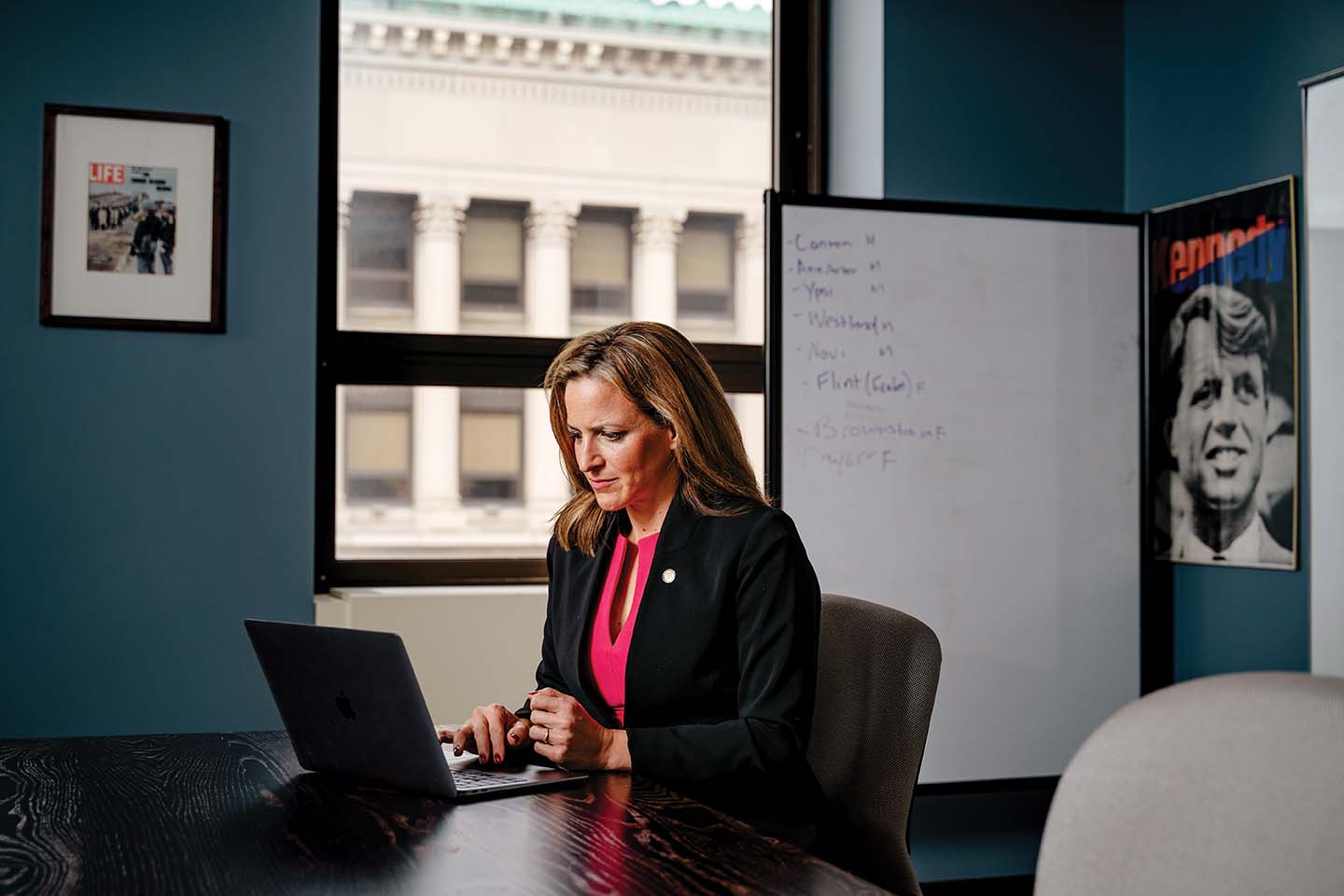
It is not unusual, as a political figure, to demur when asked what your next, likely higher aspirations are. You don’t want to seem vainglorious. It’s lousy politics to ogle greener pastures even before you’ve won your current race. And sometimes you really just don’t know what you want beyond the office you hold or seek.
Michigan Secretary of State Jocelyn Benson has a different, possibly truly novel reason for refusing to say whether she’d run for governor or some other job in 2026 if she wins a second four-year term in 2022: She’s not entirely sure American democracy will survive that long. “I don’t know what the world is going to look like in 2025, right?” Benson tells me, referring to the year after former President Donald Trump may attempt to regain the White House. “What is democracy going to look like? I truly don’t know. I have hopes for what it’ll look like. But the question at that point for me will be, Where can I best continue this work that I’ve devoted my whole career to, about just making sure voices are heard and democracy works?”
How you feel about the 2020 election and the drama that continues to follow it will dictate how you take comments like this from Benson, who has also been quoted in The New York Times saying that the American way of life faces a “five-alarm fire” and has variously stated over the past year that she and her ilk may be all that stand between the U.S. Constitution and autocracy. If you are offended by the claims by Republicans that Joe Biden stole the White House from Trump and are terrified of the widespread efforts to make it easier for states to refuse to certify presidential election results they dislike, you agree with Benson. If, despite Trump’s own national security team ascertaining that the 2020 election was “the most secure in American history,” you have doubts and believe the great injustice is being perpetrated upon Republicans, you think this lady needs a Xanax.
As for Benson, well, she’s been preparing for this situation her whole life — which means either she has monumentally impressive timing or this is the molehill she was always destined to make into a mountain. Whereas most secretaries of state around the nation run for that job as a stepping-stone to other, higher offices, the 44-year-old has for decades coveted this specific job and the power it provides to oversee elections. The seeds were planted, she says, when, between college at Wellesley and law school at Harvard, the Pittsburgh native worked as an investigator of hate groups for the Southern Poverty Law Center in Alabama. There, she says, she visited the Edmund Pettus Bridge, the site of an iconic, violent voting rights confrontation in 1965 in which demonstrators attempting a march to Montgomery were thwarted and bashed by police. “I said a prayer at the foot of the Edmund Pettus Bridge, back in the late 1990s, to just be used however I could, wherever I was, to continue the work of those folks who stood on the bridge in 1965,” she says.
After law school, she moved to Detroit to clerk for the legendary federal appellate Judge Damon Keith; wrote a book about secretaries of state; made but lost a 2010 bid for the office to Republican Ruth Johnson; taught election law at Wayne State University Law School; and by 35 had become the school’s dean. She left that post in 2016 to help billionaire developer Stephen Ross, owner of the Miami Dolphins and a WSU Law alum, launch the Ross Initiative in Sports for Equality, an effort to foster better race relations in pro sports through training programs and other activities. Then, in 2018, riding an anti-Trump midterm wave that gave Democrats a clean sweep of all statewide elected offices, Benson soundly beat Republican nominee Mary Treder Lang to assume the role she always wanted, just in time to manage the pandemic-challenged 2020 elections.
It’s understandable, then, that she feels a cosmic sense of purpose at the center of a national maelstrom in which a president — for the first time in U.S. history — refuses to accept the official election results and continues to deputize legions of his supporters to file lawsuits; stage raucous, threatening, and — in the particular case of Jan. 6 at the U.S. Capitol — violent demonstrations; and attempt to reconfigure the election system to provide levers for future ballot-box losers to undo the outcome. And she’s not the only one who feels this way. “Never have I seen a person more prepared to meet her moment of destiny,” says former U.S. Attorney Barbara McQuade, now a University of Michigan law professor and co-host of the podcast #SistersInLaw. Benson “has long been devoted to the concept of voting rights. … Now, suddenly, the battle for the soul of democracy in America is occurring in our nations’ election officials’ offices. I don’t know whether it was serendipity or if she had the foresight to see this coming, but for whatever reason, she is well prepared to meet this moment.”
Or moments. The first of these for Benson came in May 2020 when her office mailed unsolicited absentee ballot applications to all potential Michigan voters to encourage primary voting during Michigan’s stay-at-home phase of the COVID-19 pandemic. When Trump took to Twitter to claim she’d sent out actual ballots, Benson’s response that he was wrong was seen by many merely as part of a series of feuds between the president and Michigan’s three female, Democratic constitutional officers. (He’d gone after Gov. Gretchen Whitmer over her complaints of his early handling of the COVID-19 crisis, and weeks after his Benson broadside, he slammed Attorney General Dana Nessel as a “wacky do nothing” for insisting he wear a mask during a visit to a Ford plant.)
Yet there would be much more criticism to come for Benson as the 2020 general election came and went with the state’s highest-ever number of votes cast and a result that Biden had beaten Trump by nearly 155,000 votes. In a bizarre spectacle, the nation watched on tenterhooks as the state’s canvassing board — whose role is largely a formality — came within one vote, on live TV, of refusing to certify the results. Despite some 250 audits and recounts across Michigan confirming the outcome, wave after wave of fraud or conspiracy claims emerged — Why were there so many discrepancies between the vote totals and the numbers in the Wayne County sign-in books? What exactly went on in Antrim County? Why won’t Benson allow a “forensic audit”? — to the point where it’s now nearly impossible to run for office as a Republican without suggesting there are at least “questions” about what happened and blaming Benson’s performance for this lack of public confidence. Not even a comprehensive report by Republican state Sen. Ed McBroom — a rock-ribbed conservative and Trump supporter — declaring the election safe and valid has quelled the chatter.
(In an indication of the absurdity, the GOP in Oakland and Macomb counties censured McBroom for the report, even though he represents a swath of the Upper Peninsula.)
“I felt uniquely ready to take on the then-president and other attacks on our democracy because I have a deep confidence in my knowledge in preparation for this work,” Benson says, her cats Bella and Paws slinking in and out of the Zoom frame of the elegant Sherwood Forest home she shares with her husband, Related Companies executive Ryan Friedrichs, and their 5-year-old son. “It turns out the biggest challenge to election security in 2020 wasn’t actual hacking of machines or hacking the system but hacking voters’ minds and trying to actually undermine elections through lies and misinformation, targeting voters, and creating chaos and confusion about the process.”

The first time I meet Benson, we are about to blitz through the tiny Department of Motor Vehicles branch in Monroe, one of many site visits she routinely makes to tend to the other big piece of the secretary of state gig: making sure the DMV runs smoothly. During her campaign and inaugural speech, she promised the public would be able to get in and out within 30 minutes; for most of her tenure, that goal has been elusive. Between staffing shortages, technology problems, and then the closures and crowd limits brought on by the pandemic, the beat on Benson’s governance of the “consumer” side of her job has been brutal, even from supporters. “I don’t know anyone who has had a good Secretary of State customer experience during the lockdown,” Democratic political consultant Joe DiSano says. “That stuff matters, especially when folks are angry.”
Jeff Timmer, the former state GOP executive director and co-founder of the anti-Trump group The Lincoln Project, admires Benson’s fortitude on voting rights but worries about her execution on the DMV side of things: “I went with my dad to do a transfer of automobile title. We had an appointed time to be there, and we ended up having to wait like an hour beyond that time for them to call us to go about the business. I was sitting there just listening to the conversations. And it was kind of like, ‘This used to be really bad, but now I can’t even believe how bad it is.’ People were just mad.”
Benson knows this is a vulnerability, which perhaps explains our drop-in at a quiet DMV office on a midweek afternoon when odds were slim there’d be any frustrated customers waiting around. The long delays of earlier in 2021, she says, came because extensions for renewals that the Legislature put into place on account of the pandemic ended all at once, creating a backlog and crush that led to experiences like that of the Timmers. She extols the new technology, fully in place by summer 2021, that enables most transactions — license plate and driver’s license renewals — to be done without a visit. Under her predecessor, she says, the DMV wait times had tripled from 14 minutes in 2011 to 43 minutes in 2018; 80 percent of visitors now schedule their appointments online and are in and out in under 20 minutes.
The political trouble for Benson is that even if her data is correct — and there’s no real way for journalists to confirm it — it still can’t erase the bad taste, fair or not, of anyone who struggled with the office in the first three years of her tenure. Indeed, even during our visit at the Monroe DMV, there was a peculiar moment where Benson chatted up one of the clerks. She had just finished an upbeat conversation with another clerk who enthusiastically told her how much easier the new systems were and how much happier the customers are. But the second clerk? Not quite so effusive.
“How is the new system going?” Benson asks. The clerk, jittery at being put on the spot in front of a gaggle of official-looking folks and a journalist, answers cautiously and haltingly, “It’s an adjustment just because, yeah, but it works.” Benson pauses for whatever else the clerk might say, and nothing but an awkward silence ensues. “Well,” Benson eventually says before moving along, “thank you for working throughout the pandemic.”

If her electoral fate depends on her DMV work, Benson might be in big trouble as she heads into her reelection bid. And she certainly has cause for concern anyway because the political climate for Democrats is turning so sour amid the still-lingering pandemic and outrage over inflation that The Cook Political Report recently shifted Whitmer’s reelection chances — once a slam dunk — to “toss-up.” If Whitmer sinks, the thinking goes, the entire Democratic ticket drowns with her.
Yet Benson intends to make this campaign about the question of who will safeguard democracy itself. She agonizes over what might have happened in 2020 had a pliant Republican secretary of state in Michigan given in to Trump’s pressure and refused to back up the outcome at the polls. She expresses awe at two of her Republican counterparts — Georgia Secretary of State Brad Raffensperger and Nevada Secretary of State Barbara Cegavske — who affirmed Biden’s wins in their states and suffered a torrent of threats, abuse, and party ostracism for doing so. Benson, Raffensperger, Cegavske, and Democratic Arizona Secretary of State Katie Hobbs were in close contact in those tumultuous post-election weeks, Benson says. Benson, too, fielded threats and endured a late-night protest outside her home by a crowd toting bullhorns and Trump flags.
“The most frustrating thing was how many of our colleagues who didn’t have the same experience didn’t understand what we were going through,” she recalls. “I think they do now, but it was difficult to try to explain to the secretary of state of Colorado or Ohio, like, this is what we’re dealing with — we need your support. And they say, ‘Why? Everything’s great. We’re good. Our states are great.’ We’re like, ‘The storm’s coming to you as well.’”
The day of our second interview, in fact, coincided with an announcement out of Arizona that an extensive, expensive “forensic audit” conducted by Trump supporters had concluded with Biden’s lead growing. I expect Benson to be relieved and perhaps triumphant, but no such endzone jig is forthcoming.
“This is a political strategy designed to sow seeds of doubt among the public, not just about the results of the 2020 election but about their faith in democracy in general, and facts and data and truth don’t matter to that strategy,” she says. “They’re just going to keep trying to find ways — whether it’s through court cases, whether it’s through fake audits, whether it’s through legislative hearings — to keep that narrative out there with an eye towards, ultimately, what we’re seeing in other states, which is changing the rules of democracy to make it harder to vote and to potentially make it easier to block election results they don’t like in the future.”
So far, political observers say, her potential 2022 opponents don’t seem serious. One, community college instructor Kristina Karamo of Oak Park, has, as of early January, flatly refused to interview with any non-pro-Trump outlets, and the other, state Rep. Beau LaFave of Iron Mountain, scheduled at least three different appointments to speak with me only to stand me up each time. Benson’s opponent will be chosen not by a primary election but by attendees at the state GOP convention, a crowd likely to be especially dedicated to the debunked claim that Benson stole the state for Biden in 2020. Karamo, who alleges she witnessed fraud as a poll challenger during the state’s counting of absentee ballots, would seem to have the upper hand for the nod given she boasts Trump’s endorsement and that she insists the Jan. 6 riot in Washington was carried out by anarchists pretending to be Trump supporters.
“If the GOP nominates QAnon conspiracy theorists, Benson will have an easier path forward, even if the national political mood tilts, to some extent, against the Democrats,” says Tom Ivacko, executive director of the University of Michigan Center for Local, State, and Urban Policy, referring to a shadowy online persona that promulgates myriad false conspiracy theories about Democrats. “It’s hard to imagine QAnon conspiracy purveyors winning state office in Michigan. But perhaps a large enough GOP wave could sweep them in, too.”
That, of course, is what Benson fears most — and why her 2022 effort is likely to be a pull-out-all-the-stops, unusually star-studded campaign for a usually lesser-noticed job. For this story, for instance, Stephen Ross, a Trump supporter who was her boss at the Ross Initiative, happily pops on the phone to rave about her competence. “If Jocelyn believes in something, nobody gets more involved than she does,” he tells me. Detroit Pistons Vice Chair Arn Tellem, too, is eager to chime in on their joint work encouraging Detroiters to vote: “She’s, to me, a dear friend, a great leader, a very effective secretary of state, someone for whom I have the highest regard.”
Benson, who famously completed the Boston Marathon while 8.5 months pregnant, leans hard into the running metaphors in describing her determination to still be in office in 2024 to protect Michigan’s vote. “I’m a marathon runner, and I will have more endurance than anyone,” she tells me. “Bring it on. I’m ready for the fight, however long it goes, however long it takes.”
And whatever the fate of democracy, Ross says Benson will thrive. She won’t talk about her future, but the billionaire has some thoughts: “She’s a woman that certainly, when she gets done with this, will have a tremendous amount of opportunities and choices. We’ve talked about some of them. She’s going to make the right decision that’s best for her, and as with anything she does, I think she will be a champion.”
This story is featured in the February 2022 issue of Hour Detroit magazine. Read more stories in our digital edition.
|
|
|









